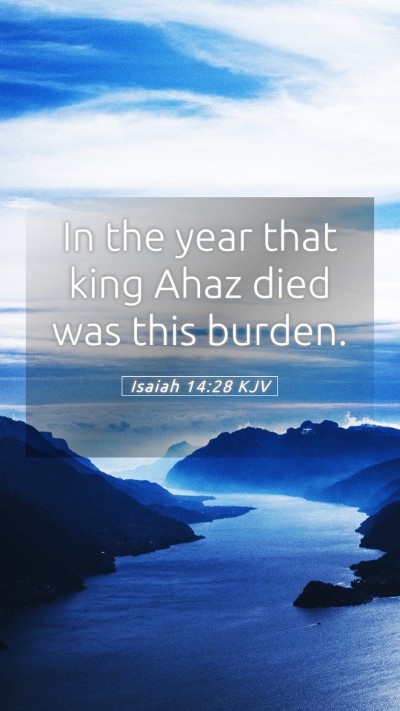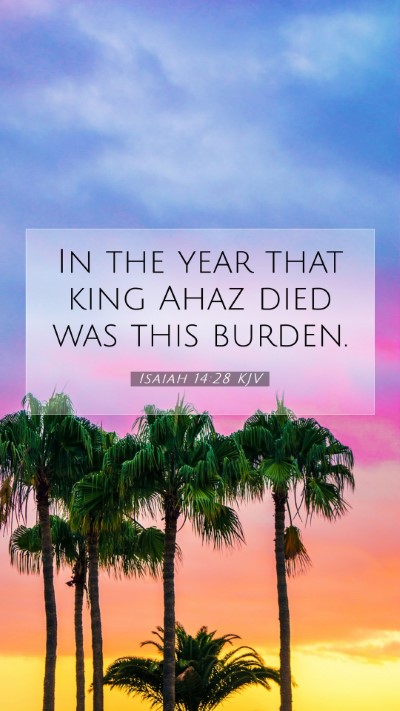Understanding Isaiah 14:28
In this section, we will explore the meaning and interpretation of Isaiah 14:28, drawing insights from well-respected public domain commentaries like those by Matthew Henry, Albert Barnes, and Adam Clarke. This analysis will serve as a valuable resource for those seeking Bible verse meanings, Bible verse interpretations, Bible verse understanding, and Bible verse explanations.
Verse Context
Isaiah 14:28 states: "In the year that King Ahaz died was this burden." This line falls within a larger prophecy concerning the fall of the king of Babylon, and it sets the stage for the broader themes of judgment and restoration prevalent throughout the book of Isaiah.
Key Themes
- Historical Context: The mention of King Ahaz hints at significant historical transitions within Israel. His reign was marked by instability and idolatry, and his death marked the end of an era.
- Prophetic Announcement: The phrase "this burden" indicates the seriousness of the prophecy. It indicates a message that carries weight, meant for both warning and hope.
- Transition in Leadership: The verse signals a shift, both politically in Judah and spiritually among the people, reflecting God’s sovereignty over nations and rulers.
Commentary Insights
Matthew Henry's Commentary
Matthew Henry notes that this verse serves to enrich our understanding of God's divine judgment and the eventual restoration following periods of turmoil. He emphasizes that the death of worldly kings is part of God's ultimate plan, and that human rulers could not thwart God's purposes.
Albert Barnes' Notes
Albert Barnes elaborates on the significance of Ahaz's death, arguing it brings a close to a troubling period. He stresses the idea that God's plans extend beyond political leaders, suggesting a divine orchestration that restores hope amongst despair.
Adam Clarke's Commentary
Adam Clarke provides a deeper analysis of the cultural and historical implications of the text. He highlights the transitions in leadership that often accompany divine revelation. Clarke also points out that this verse serves as a reminder of God's faithfulness even in times of human failure.
Application to Daily Life
For today's readers, Isaiah 14:28 can be applied in many ways:
- Faith in Transition: Just as God intervened in the leadership of ancient Israel, He remains active in guiding us through personal and communal changes.
- Hope Amidst Judgment: Recognizing that with the judgment also comes the potential for renewal and restoration can encourage believers to hope for better days.
- Understanding Authority: This verse invites readers to reflect on the role of earthly authorities in the context of divine sovereignty, reminding us not to place our ultimate trust in human governance.
Related Bible Verses
For those studying this verse further, consider these related passages:
- Isaiah 13:1: "The burden of Babylon, which Isaiah the son of Amoz did see." This verse introduces the prophecy concerning Babylon.
- Isaiah 40:23: "That bringeth the princes to nothing; he maketh the judges of the earth as vanity." This emphasizes God's control over human leadership.
- 2 Kings 16:20: "And Ahaz slept with his fathers, and was buried with his fathers in the city of David; and Hezekiah his son reigned in his stead." This outlines the transition from Ahaz to Hezekiah.
Conclusion
As we conclude our study of Isaiah 14:28, it is clear that this verse encapsulates profound truths about God's sovereignty over nations, the hope of restoration, and the significance of transitions in leadership. Those involved in Bible study groups or seeking online Bible study resources can utilize these insights to deepen their understanding of Scripture and its applications to daily life.
By engaging in Bible study insights and Bible study tools, believers can cultivate a richer interaction with the Word, fostering both personal growth and communal understanding within Bible study lessons.


